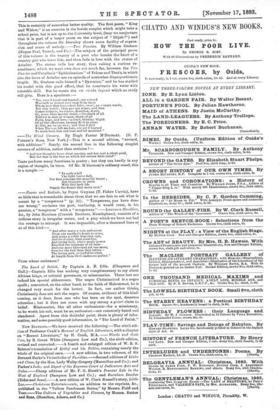POETRY.—A Volume of Poems:, by G. W. Bettany (Londob Literary
Society), is perhaps beat criticised by an extract. Hero are two stanzas from the " Battle of Tel-ol-Kebir :"— " On they go to death or glory, Trampling on rebellions sand Moving phalanxes of soldiers, Mystic in a my atio land."
" Close to where the des-By trenches Threaten dire destrnation mind, There, these gallant British fellows Lay themselves upon the ground."
"Mystic in a mystic land" is fine, though appropriately obscure, but scarcely harmonises with " gallant British fellows." Mr. Bettany essays Latin also, and among other elegancies has " Casum de superis decus," intended apparehtly for a "glory fallen from heaven ;" and even Greek, which we would reproduce, if tho eccentricities of his pointing did not forbid. From the same publisher we get another volume, Poems, by Howard Deazeloy, M.A. This is certainly of somewhat better quality. The first poem, " King and Widow," is an exercise in the heroic couplet which might take a school prize, but is not up to the University level, (may we conjecture that it is part of a larger poem on the subject of " Elijah ?") and throughout the volume Mr. Deazeley shows some facility of expres- sion and sense of melody.—Two Fancies. By William Graham (Regan Paul, Trench, and Co.)—The subject of the principal poem of this volume is the vagary of a poet who breaks the heart of a country girl who loves Lim, and then falls in love with the statue of Ariadne. The statue tells her story, thus raising a curious re- semblance, which we must own does not reach far, between the Two Fancies and Catullna's " Epithalam i um " of Pelens and Thetis, in which also the loves of Ariadne are en episode of somewhat disproportionate length. Mr. Graham calls himself a " Byronian," and he has studied his model with this good effect, that he constructs his verse with tolerable skill. But he wants the via rivida ingenii which no study will give. Here is a specimen :-
" Ye., once I loved and trusted ; my reward Was such as women ever reap from those Whom best they love,—first false, sweet, pa s'onate words, But only words ; then pas-ion wanes, and then • Comes coldness, we trines', desertion, death, Or, worse than mortal death.—'tis death of all Noblest in man or woman, death of all Faith, hope, and love,—a cruel, blasting blight Of all the affections, turning fie-h to stone As this, my im me now ; and thus I died V. hen The-ens left me lone, ere yet I learned To scorn both him and thee and all mankind."
—The Blind Canary. By Hugh Farrar M`Dertnott. (G P. Patnam's Sons, New York.)—This is a second edition, "revised, with additions." Surely, the second line- in the following couplet savours of addition, rather than revision ?—
" And her thoughts have silent nursing, and her soul a silent grief, But her tear is the bier ore which her sorrow finds relief."
Tears perform many functions in poetry ; bat they can hardly in any region of thought, be biers. Of Mr. M'Dermott's ordinary mood, this is a sample " In souls a-lull the light burns dull, Nor fires consume the peaceful breast ; But thoughts at strife With this dark life Supply the flames that never rest."
—Poems and Ballads, by Pryce Gwynne (T. Fisher Unwiu), have so little that is remarkable about them that we are fain to ask what is meant by a " tempstresa " (p. 32). " Tempstress, you have done me wrong," exclaims the poet, confusing, it would seem, in his passion, a" temptress" with a " sempstress."—Lawrence Hardiker, &c., by John Harrison (Cornish Brothers, Birmingham), consists of a tedious story in irregular metre, and a play which we have not had the courage to attempt. It was impossible, after a thousand lines or so of this kind :—
" And after many a vein endeavour From one another's heart to sever, And many a softly lingering sigh, And be uteting, fond good-bye, And loving look, whose magic power Excelled the language of an hour And one more kiss—and yet one more, Sweeter the last than that before— The loving pair, so joyf ul-heArted, At length from their embraces parted."
From whose embraces ?



































 Previous page
Previous page